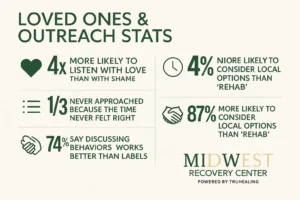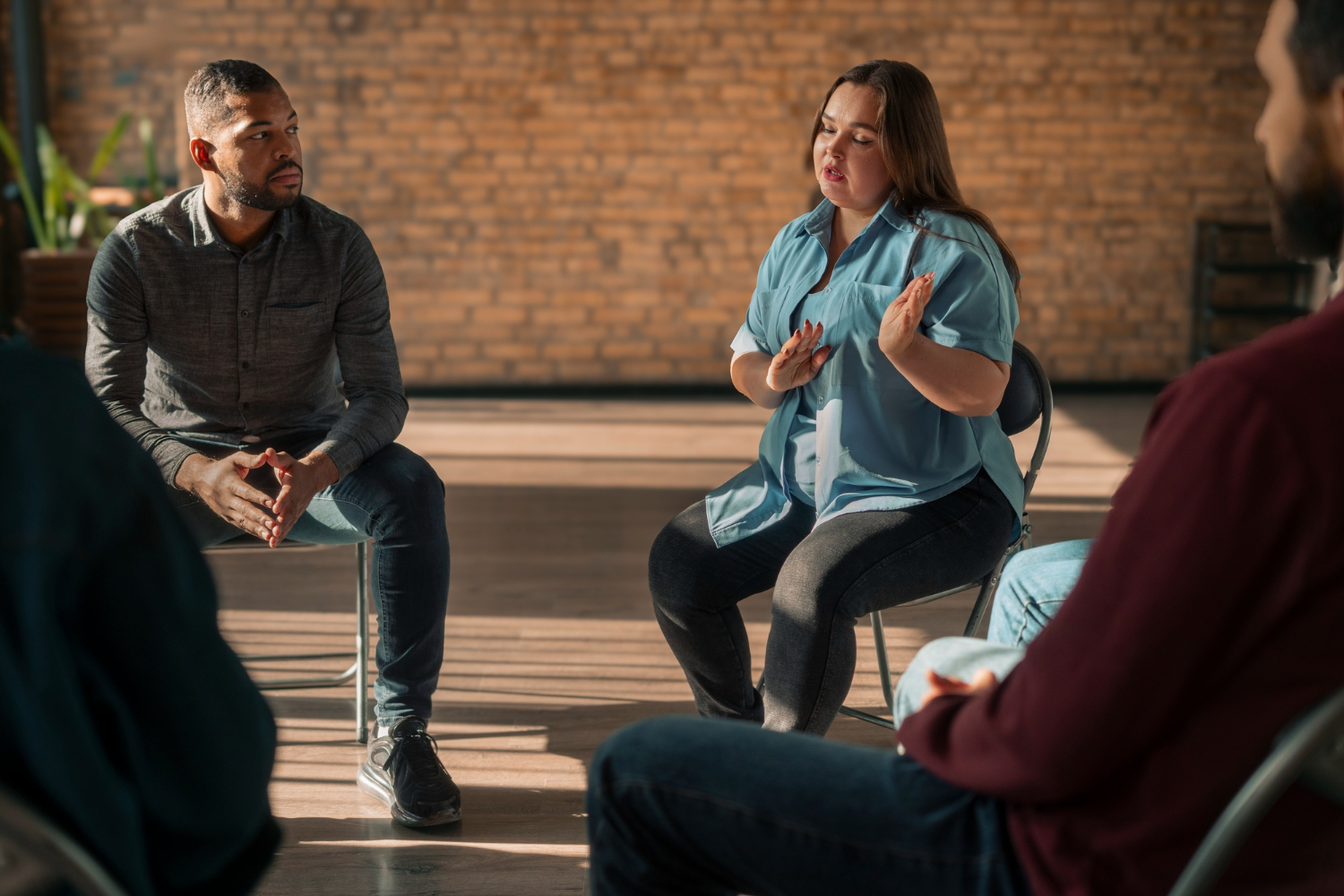Loving someone who’s struggling with opioid addiction is one of the hardest things a person can carry.
You see the moments of light in them. The laughter that still slips through. The person you fell in love with is still there—just buried under layers of avoidance, fear, and substances that promise comfort but deliver chaos.
You want to help. You want them to see their worth. You want them to believe they’re still capable of something better.
But how do you say that without pushing them away?
How do you talk about treatment without sounding like you’re giving an ultimatum?
How do you even begin?
At Midwest Recovery Center, we work with spouses, partners, and loved ones who’ve stood exactly where you’re standing now. This guide isn’t about perfect scripts. It’s about leading with love, clarity, and emotional safety—even when things feel fragile.
Here’s how to start the conversation about opioid addiction treatment in a way that builds trust and opens the door to change.
Lead With Love—Not Fear
When you talk to someone about their opioid use, what you say matters—but how you say it matters more.
The goal is to meet them with care, not confrontation. Think connection, not correction.
Try starting with:
- “This is coming from love. I’m not here to judge you—I’m here because I care.”
- “I’m scared, not angry. And I’m bringing this up because I want us to have a future together.”
- “You matter to me, and I hate seeing you hurt.”
You’re not lecturing them. You’re not diagnosing them. You’re telling them what you see—and how it makes you feel—because you love them.
Timing Is Important, But So Is Courage
There’s no perfect moment for a conversation like this.
If you wait for them to be “in a good place,” that day might never come. But there are better moments—times when they’re relatively calm, not under the influence, not in the middle of an argument or crash.
That said, don’t let fear of timing keep you silent forever. If you’ve seen patterns escalating, trust your gut.
One heartfelt conversation today might be the thread that holds the door open for help tomorrow.
Talk About Behaviors—Not Labels
Avoid calling your loved one an “addict,” even if you feel sure that’s what’s going on.
Instead, speak about what you’ve seen:
- “I’ve noticed you’ve been sleeping a lot more lately.”
- “You’ve pulled away from people you used to love.”
- “You don’t seem like yourself anymore.”
Use “I” statements when possible. Not “You’re ruining everything,” but “I’ve been scared and sad watching how this is affecting you—and us.”
It keeps the conversation grounded in emotional truth, not accusation.
Make It Safe to Say “Yes”—And Safe to Say “Not Yet”
Your loved one may not be ready to accept help the first time you bring it up. That doesn’t mean the conversation failed.
What matters most is that they remember how you showed up—with compassion, not control.
You can say:
- “I’m not going to pressure you. But I hope you’ll keep thinking about this.”
- “Even if you’re not ready today, I want you to know this door is open.”
- “I believe in who you are—beyond this.”
They may need to hear it more than once. That’s okay. Planting the seed can be more powerful than you realize.

Offer Realistic, Local Options—Not Just “You Need Help”
Telling someone they need help is one thing. Giving them an actual next step is another.
Instead of “You should go to rehab,” try:
- “There’s a program near us in Maumee and Perrysburg. They specialize in opioid addiction treatment. I could call with you, if you want.”
- “I looked into Midwest Recovery Center. They don’t force anything—you can just talk to someone.”
- “You don’t have to decide everything today. But we could start with a phone call.”
When the option feels real and nearby, it becomes more possible in their mind.
Expect Emotions—But Stay Grounded
Your partner may get angry. Defensive. Shut down. They may cry. Or they may go quiet.
Remember: their first reaction isn’t their final answer. Substance use hijacks trust and distorts fear. You may have to absorb their reaction without taking it personally.
That’s why it helps to prepare yourself before the talk. Get grounded. Take a few deep breaths. Have support for yourself, whether it’s a therapist, friend, or support group.
You deserve steadiness—even as you offer it to them.
Know That Their Recovery Is Theirs—But You Can Still Be Part of It
You can’t force someone into sustainable change. But you can remind them of who they are beyond the addiction.
You can say:
- “I want you to get help not because I’m mad—but because I miss you.”
- “I still see the good in you—even when you can’t.”
- “You’re not too far gone. And I’m not giving up on you.”
The path ahead won’t be easy. But it gets easier when someone they love reminds them that they’re worth saving—and that it’s not too late.
Frequently Asked Questions for Partners and Spouses
What if my partner refuses to talk about it?
That’s common—especially at first. Stay calm and open. You can let them know you’re ready when they are: “I don’t want to fight. I just want you to know I’m here when you’re ready to talk.”
What if I’m not sure they’re using opioids, but something feels off?
You don’t need a diagnosis to share your concern. Talk about specific behaviors you’ve noticed. Trust your instincts and focus on how their actions are affecting both of you.
Can I force them into treatment?
In most cases, adults must choose treatment voluntarily. There are some legal exceptions, but meaningful recovery comes when the person chooses to engage in help. Your role is to support, not to control.
Should I give them an ultimatum?
Ultimatums can backfire unless you’re truly prepared to follow through. Clear boundaries are important—but lead with clarity, not threat. For example: “I can’t keep doing this with you using—but I can walk beside you if you’re ready to get help.”
What if I need support too?
You do. And you deserve it. Whether or not your loved one accepts help, your pain is real. Consider counseling, support groups for families, or talking to the team at Midwest Recovery about how to stay grounded during this time.
You Can’t Fix Them—But You Can Love Them Through the Hardest Part
If you’ve been carrying this silently for a long time, please know: the way you love them matters.
Even when they push you away.
Even when they deny everything.
Even when you’re tired of hoping.
You don’t have to have the perfect words. You just have to show up with honesty, kindness, and a path forward.
We’ll help with the rest.
When they’re ready to talk, we’ll be here.
Call (888) 657-0858 or visit Midwest Recovery Center’s opioid addiction treatment program in Toledo, Ohio to learn how we support individuals and families in navigating the first step toward change—together.


























